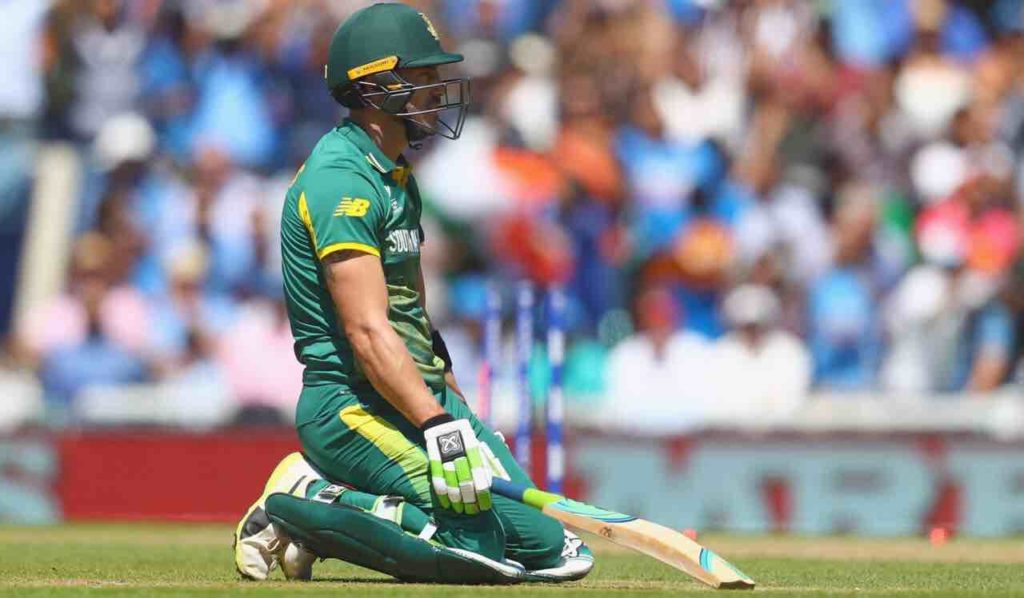The Proteas lost their last eight wickets for 75 runs as they were bowled out for 191 against India at the Oval.
It’s going to take an effort of gargantuan proportions from the Proteas to stay in the Champions Trophy from here. It seemed like they’d done all the hard work to see off the first 17 overs without losing a wicket. Then came two wickets at the worst possible time for the South Africans. And then came the run-outs.
If it wasn’t a do-or-die match, would Faf du Plessis have attempted that run to point? Perhaps. But would David Miller have attempted to steal a single against Hardik Pandya at short third man? Almost definitely not. There wasn’t any genuine pressure on them to score quickly, but the occasion has, so far at least, gotten the better of them in front of the overwhelming sea of blue circling the Oval in the stands.
At first, losing the toss didn’t seem too catastrophic. The pitch was playing up a bit, and there was talk of it worsening as the day progressed. But we’ve seen targets chased down comfortably throughout this tournament so far.
Hashim Amla and Quinton de Kock repeated their plans from the first two matches, which was to see off the first 10 overs on unpredictable surfaces. They did that effectively, scoring 35. Amla took 40 balls to reach 16, but then he hit a six and two fours pretty quickly, and the Proteas were suddenly well-set.
That’s when India struck. Ravichandran Ashwin, playing his first game of the tournament, found Amla’s edge for 35. Faf du Plessis settled down pretty quickly with De Kock. De Kock has made a habit of scoring centuries when he passes fifty against India, but no such luck on this occasion, bowled by Ravindra Jadeja for 53.
With four hundreds from his last seven ODIs against India, the reception around the ground was met with a smattering of cheers when De Villiers strode to the crease. A hero to most in the subcontinent, but a rival today. And he got going pretty quickly, too. Until the run-out.
Attempting a quick single to Jadeja is never a good idea, even with the pace that Du Plessis and De Villiers have between the wickets. Like the fixture between the sides in the 2015 World Cup, as well as the 2011 quarter-final against New Zealand, De Villiers was run out, with Du Plessis watching helplessly from the other end.
De Villiers’ 12-ball 16 came to an end, and Miller swiftly followed. If the first run-out was madness, then the next was simply suicidal. Miller attempted a quick single that went straight Pandya at short third man. Du Plessis, realising that the run wasn’t on, got his bat in at the striker’s end quicker than Miller. Miller had to walk back for one.
JP Duminy became the glue that gave the Proteas a chance of passing 200, as Du Plessis chopped one on to his stumps for 36. But the crowd were fired up, and so were the Indian players. Chris Morris skied one for four, and, after an lbw review, Andile Phehlukwayo followed him back for the same score.
Duminy’s partners fell around him so quickly that he didn’t get a chance to open his shoulders. He was stranded on 20 off 41 balls, as Kagiso Rabada and Morne Morkel fell victim to Bhuvneshawar Kumar in consecutive deliveries, before the third run-out of the innings, in what was yet another mix-up, saw Imran Tahir short of his ground to wrap up the innings.
The Proteas must believe they can defend this with the bowling stocks that they have and on a wicket that’s still playing up a bit, but India are very close to setting up a semi-final clash against Bangladesh.
Photo: Clive Rose/Getty Images







